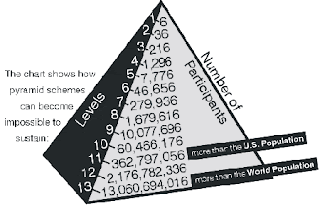Parallels can also be drawn to the stock market. IPO investors are more likely to get their money, plus a nice bonus, for their troubles than the later investors whose buying pushes up the price. To people who see little difference between Ponzi schemes and the equity markets anyway, perhaps this similarity is not that striking. Indeed, extreme proponents of such theories might suggest that, like illegal pyramid schemes, stock markets should be shut down. We are certainly not suggesting that however. Indeed, on the contrary, what if we took the other side altogether. What if to be provocative, we suggested that Ponzi schemes, like pension plans and stock markets, should be legal?
Page 14 of the prospectus might look something like this...
Most people on gut reaction would answer no to such a proposition. So let's go further. In the contra examples to Ponzi schemes provided above it is notable that both pension schemes and equity markets are regulated and that participants presumably know at least some of the risks. So what if Ponzi schemes came complete with prospectuses outlining the risks of participation? If the answer with these amendments is still no, maybe it would be helpful to remind readers that lotteries are essentially Ponzi schemes, though even arguably more extreme as there are fewer 'winners.' Maybe the reader is opposed to investing and/or lotteries altogether. However, for everyone else, it might at this point be tough to come up with reasons why something defined as a completely voluntary fund with complete transparency which promises nothing more than your money back with the possibility of a return 'if you get out early enough' (i.e. win) shouldn't exist.
Of course tricking people out of their money is bad; certainly Bernie Madoff was a bad guy and we by no means wish to make light of the actions which have, and continue to, ruin lives. However, the idea of transparent and legalized pyramids is intriguing once you think about parallels to other situations which, if arguably moral, are certainly legal. It is also probably worth noting that as a practical matter legalized Ponzi schemes are highly unlikely to ever be an investment choice for readers, if for no other reason than the fact that governments rather like their monopolies on lotteries.
However, issues of morality and practicality aside, it was nonetheless thought-provoking when I initially heard the correct but rather light definition of Ponzi scheme noted above. The striking immediate thought was that sometimes perspective is everything. Ponzi schemes are bad, but often things that are viewed as inherently 'bad' by society don't need too much work before they look a little better or even mirror others which are at the very least legal. The exercise above is a good show of this. This can make the line between shades of morality blurry sometimes.
Therefore the ultimate lesson might be not related to whether we should legalize Ponzi schemes at all, but instead should be taken from the gut reaction I had of their definition; though instincts are often important in life, it is sometimes careful consideration from different viewpoints which produces the types of analysis that good decisions can soundly be based on. All that said, here's hoping that careful consideration doesn't lead you into a Ponzi scheme, especially the illegal kind...

No comments:
Post a Comment